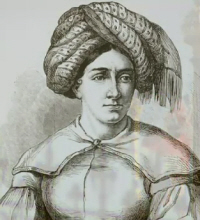Lady Sale Diaries
Macabre Fascination with Wartime Violence
The British government would have liked to cover up the extent of the tragedy of Khord Kabul, but it was not to be. Almost every last grisly detail was immortalised in the best selling diaries of Lady Sale, wife of one of the senior officers in the Kabul Army.
She was captured during the retreat and later released, and her original diaries and letters are kept here that the British Library. I took a look At them with historian Jane Robinson.

Jane Robinson “Well, the book ran into several reprints the first couple of years. It sold several thousand copies, which was huge, and it was serialised in The Times. And the response to it was unprecedented, I think, because this was the first time that a woman, a British woman, had written from the theatre of war.”
Lady Sale’s account of the retreat from Kabul was shockingly explicit.
Jane Robinson “To see women and children and soldiers and camp followers in various states of decomposition, and she actually describes it… I see here that some of the text has been excised, I think it’s possibly been too strong. This was horrific stuff.”
Rory reading from the book “Subsequently we heard that scarcely any of these poor wretches escaped and that, given to the extremes of hunger, they’d sustained life by feeding on their dead comrades.”
Jane Robinson “And she knew that the army was doomed. She does say earlier on, ‘I fear that nobody is going to survive this.’”
The newspaper serialisation sparked a macabre fascination with the savagery of the Afghans.
Jane Robinson “She was a British representative in Kabul. She was part of the establishment there part of the machine. And the fact that she had been attacked by the Afghans, it meant that the Afghans were particularly dastardly because they had attacked what was most, not sacred, but almost sacred, about British society abroad.”

But, actually, that’s extremely unfair of them, in fact, the Afghans went out of their way to save all the women and children.
Jane Robinson “Yes, but that’s not what the audience got from this. Not at all. What they saw was the sensation. What they saw the dead bodies. What we saw was a cannibalism.”
Perhaps to limit the damage to our imperial reputation, the British spun this as a story of heroism and bravery.
Jane Robinson “The way this was treated when it was published was, indeed, propaganda, I think. She was paraded before Queen Victoria. There was a city named Sale in Australia. There was a ship named Sale in the Navy. And she was promoted as a heroine. She was made into a celebrity to try and distract, I think.”
We’re defeated, but we took out of the defeat the fact that we’re really lions.
The British Empire had been humiliated. And the defeat was seared into our historical memory, creating a view of Afghanistan as a graveyard of empire, an unconquerable land.
Additional Reading
[amazon template=template&title=-&artist=-&asin=1846777313] Lady Sale’s Afghanistan: an Indomitable Victorian Lady’s Account of the Retreat from Kabul During the First Afghan War by Florentia Sale
